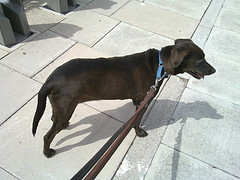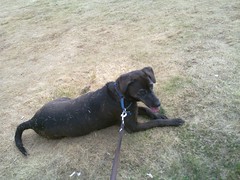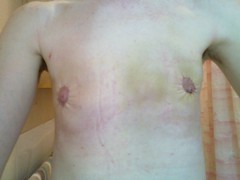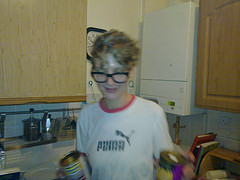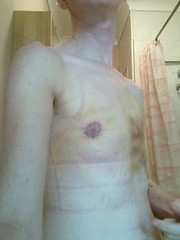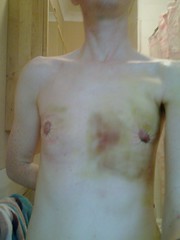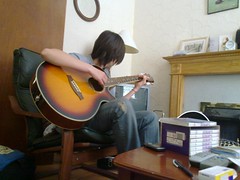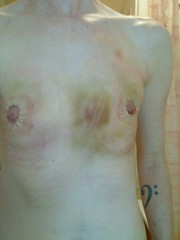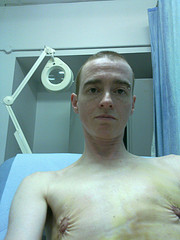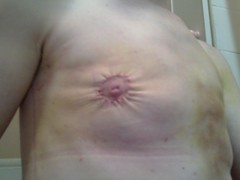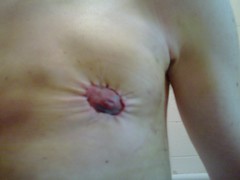A few days before I left England, my ear began to itch, in the spot where I used to have a cartilage piercing. I didn’t worry about it, but scratched at it, absentmindedly, thinking I really should do something about it but then forgetting. Then I got on a 10 hour flight, followed immediately by a 16 hour train ride. I got to my dad’s house and felt exhuasted and my ear was irrated to heck. I caught a glimpse of it in the mirror and my entire ear was red enough that I could step in for Rudolph and save Christmas, in case a holiday movie suddemly formed around me.
My dad took me to see a doctor at an “urgent care clinic.” This is American for a walk-in clinic. First, a nurse took my contact details and then told me to wait in the lobby. The primary feature of this was a large flatscreen TV showing adverts for prescription drugs. “Feeling stressed? Ask your doctor about Damitol. Damitol can help with burts of impotent rage. Do not take Damitol if you are already taking Fukitol. Side effects of Damitol may include becoming red faced, excessive sputtering and fatigue. Damitol works best when combined with diet and exercise. . . .” Blah blah blah. They had a 5 or 10 minute advert for a diabetes drug. Then they had a minute or two of random health-related information, then another advert. It was all branded as CNN Health.
“This is weird.” I said to my dad.
“I think it’s just general information about insulin . . . oh. That is weird.”
A nurse took me back, weighed me, took my blood pressure, pulse and temperature and asked about allergies. All interactions with healthcare providers in the US start with weight, blood pressure, etc. I explained about my ear, which was significantly less red by then. She took notes and left.
A moment later, the doctor came in and I repeated my story. He looked at my ear for 5 seconds and prescribed sulfa antibiotics. “They’re cheap,” he explained. I asked something about my ear and he said it was probably a staph infection and they tend to respond to sulpha.
“Staph?!” I thought.
“Unless it’s MRSA,” he continued.
I quit listening to his list of dire diseases. I asked about side effects and he started talking about posssible allergic reactions. “In the worst case your mouth and tongue will swell up and . . .”
“I just wanted to know if it was ok to drink or not.” I interrupted.
“If you drink, it will make the allergic reaction hit more quickly . . .”
I stopped listening again. Then I went out to the front to pay. Actually, my dad paid. It was over $100. Then we went to a pharmacy, where the drugs were only $14. They really were quite cheap.
The pharmacist explained that they might upset my stomach, etc. i had forgotten that in the States, you get this information from pharmacists and not doctors. Probably because we were in Washington state, she didn’t mention that I should stay out of the sun.
So I started taking antibiotics, wondering if my British GP would have prescribed them. he certainly would have poked my ear several times first. I also started putting hot compresses on it. It hurt if anything touched it, so no wearing headphones or hats or sleeping on that side.
Last night, on the 8th day, it was bright red again. And still hurting and warm to the touch this morning, so I resolved to go to a clinic. I called the one closest to my house. They weren’t answering, so I called another which was taking a holiday and then another and another. Every clinic seems to be closed today, except for one 3 miles away, which said it was open, but the recptionist was busy. I cycled over. It was closed.
Finally, I tried the Berkeley Free Clinic and was startled when a person answered. I described my woes. “You need to be seen,” he said, but they couldn’t see me before Monday. “Do you have money or insurance?” The person asked. Money, yes. Insurance, no. He suggested that I go to Highland Hospital. “They have an urgent care clinic. Go to the emergency room and they’ll direct you.”
I faffed around for a bit and finally got on a bus. Highland is an emergency-only hospital with a reputation for highly organised, professional helpful staff in the midst of the complete chaos.
I asked for the urgent care clinic and was told it had closed down. They said they just do it all in emergency now. The intake person said it was fine that I wasn’t having an emergency and took my ID and told me to sit.
I got called up to a triage desk and a nurse took my temperature pulse and blood pressure and asked about allergies and past illnesses. “When was your last tetnus shot?” Then she asked what the problem was and gave me a red wristband to indicate that I have allergies. She told me to wait in a different room.
I got called back to a different desk where I was asked for ID again, address, emergency contact information, mother’s maiden name, social security number, whether I had a job and a GP and many other questions. “Did you come by car or bus?” Then, she told me to wait again.
A nurse called me and walked me over to a bunch of cublicles. “Wait here for a moment.” He said and then vanished. A while later, a woman introduced herself as a doctor and I repeated my entire tale of woe. She looked in my ears and then prodded my ill one a bit. She said it was a minor infection and would probably go away on its own, but decided to prescribe me new antibiotics. She told me to keep sitting there and a nurse would come.
The nurse had the prescription forms. “You have to take these every 6 hours, which is a pain in the ass.” She looked at my warm, but no longer red ear and wondered why I had been given a prescription at all. She lead me to wait for a financial advisor. While waiting, I heard an announcement calling the trauma team to assemble, saying a type 2 trauma would be arriving in 8 minutes.
The financial person asked if I had a job and for ID. I said I worked in England. “So you’re not a resident of California?” Well, I kind of am, I’m just studying abroad. I gave her my expired drivers lisence. It has the wrong name on it. This did not help clarify matters. She said I would need to provide pay stubs to prove my income. I said they were in England. She sent me to wait to talk to her supervisor.
I looked at the information provided to me while I waited. “Cellulitis usually clears up on its own.” No mention of staph or mrsa. The financial person called me back.
“You’re not a resident here.” We began again. I finally gave up. She asked what had happened during my visit. “Oh, that won’t cost much anyway.”
“How much will it be?”
They don’t tally it up for a couple of weeks. In my experience, a trip to an emergency room is at least $400, so I really hope this will be billed as if their clinic still existed.
I took the prescription to Walgreens pharmacy, despite knowing that they have a 1000% markup on some drugs, including ones I got from them in the past. 7 days of the new antibiotic cost $60, but if I spend $20 to enroll on their discount program, I could get it for $30. Obviously, they have a large markup on antibiotics also. Charming. I enrolled in the program. The form I got explained that it was not health insurance. No kidding.
Post Script
The bill from Highland came out to $283, which is a lot less than I’d anticipated.
